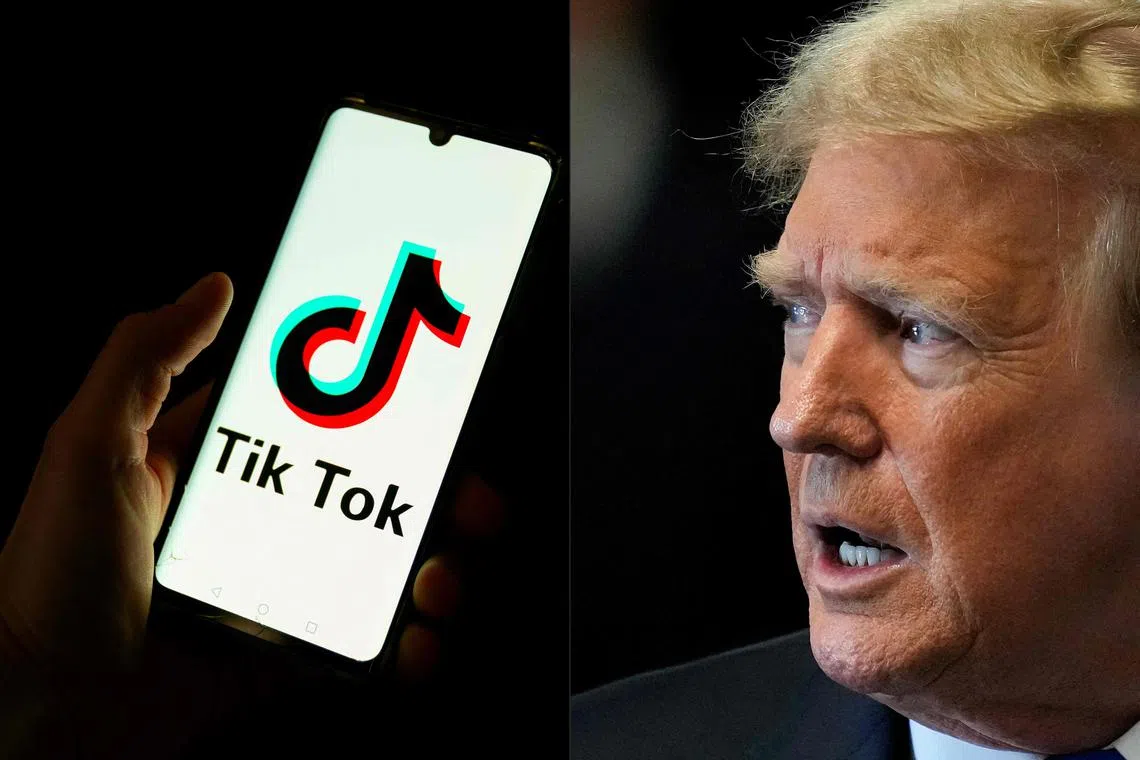Trump asks Supreme Court to pause law threatening TikTok ban
Sign up now: Get ST's newsletters delivered to your inbox

US President-elect Donald Trump said a pause would provide “breathing space for the court to consider the questions on a more measured schedule”.
PHOTO: AFP
Follow topic:
NEW YORK - President-elect Donald Trump thrust himself into the high-stakes fight over the fate of TikTok in the US by urging the Supreme Court to pause a law that would ban the social media platform if it is not sold by its Chinese parent company.
Trump said the court should give him time after his Jan 20 inauguration to “seek a negotiated resolution” of the dispute. He did not take a firm position on the constitutionality of the law that is set to take effect on Jan 19, though he said it raised “sweeping and troubling” free speech concerns.
Trump told the justices that only he “possesses the consummate deal-making expertise, the electoral mandate, and the political will to negotiate a resolution to save the platform while addressing the national security concerns expressed by the government”.
He did not give specifics about what kind of deal he would seek or say how long a delay he needed.
The court is hearing the case on a highly expedited timeline, with arguments scheduled for a special session on Jan 10, a little more than a week before the law is to take effect. The case pits company and user First Amendment rights against national security interests.
Trump said a pause would provide “breathing space for the court to consider the questions on a more measured schedule”.
His filing followed duelling written arguments submitted on Dec 27 by TikTok and President Joe Biden’s administration.
The Biden-run Justice Department said Chinese control of TikTok poses “grave national security threats”. The platform “harvests sensitive data about tens of millions of Americans and would be a potent tool for covert influence operations by a foreign adversary”, argued US Solicitor General Elizabeth Prelogar, the administration’s top Supreme Court lawyer.
Meanwhile, TikTok told the justices that Congress failed to consider alternatives short of a ban. “History and precedent teach that, even when national security is at stake, speech bans must be Congress’ last resort,” the company argued.
Trump once supported a TikTok ban, but has spoken more favourably about the platform in recent days. He said in December that he has a “warm spot” in his heart for TikTok because it helped sway young voters to his side in the November election. He met TikTok chief executive officer Chew Shou Zi
During his first term, Trump said he was willing to let TikTok be sold to a US company – but expected that the federal government would receive a portion of the overall sale price for helping to facilitate a deal.
Should the law take effect, Trump’s stance could affect how it plays out in practice. The Justice Department is charged with enforcing the law and, as president, Trump would have the power to approve any divestment proposal.
His filing on Dec 27 suggested sympathy with the free speech arguments presented by the company and TikTok users.
The law “may set a dangerous global precedent by exercising the extraordinary power to shut down an entire social-media platform based, in large part, on concerns about disfavoured speech on that platform”, Trump said in a filing submitted by Mr John Sauer, whom the President-elect has tapped to become his solicitor general.
A federal appeals court in Washington upheld the law on a 3-0 vote in December, saying Congress and the president are entitled to a wide berth when they make national security determinations. The law is also being challenged by a group of content creators. BLOOMBERG

